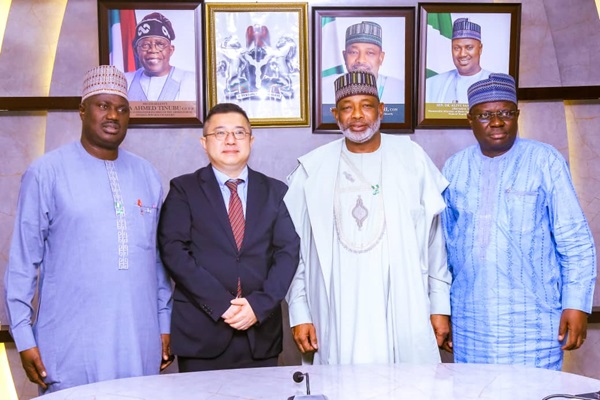
The Minister of Agriculture and Food Security, Sen. Abubakar Kyari has commended the Japan International Cooperation Agency (JICA) for its emergency support of a ¥12 billion loan to Nigeria.
The funding, under the National Agricultural Growth Scheme and Agro-Pocket (NAGS-AP), aims to enhance sustainable and resilient agriculture in the country.
Kyari noted that the facility would be utilised across three key areas: improving rice seed quality, enhancing the delivery of farm inputs, and strengthening extension services while increasing private sector participation in agricultural input production. He made the commendation during a meeting with a delegation from JICA’s Economic Development Department, led by its director- general, Takao Shimokawa, at his office in Abuja.
He emphasised that the rice seed production initiative, housed at the National Cereal Research Institute (NCRI) in Badeggi, Niger State, is a crucial step in advancing research and development efforts. The goal is to breed high-yield, disease-resistant rice varieties capable of withstanding climate variability. The minister assured that the government, in partnership with NCRI and the National Agricultural Seed Council (NASC), would work to improve the seed ecosystem and add value to agricultural production.
Kyari stressed that while improving seed quality is vital, ensuring knowledge dissemination is equally important. He cited Nigeria’s partnership with JICA on the Smallholder Horticulture Empowerment and Promotion (SHEP) project, which ran from 2020 to 2024 across 14 states, including Nasarawa, Benue, Osun, Ogun, Kogi, the FCT, Taraba, Jigawa, Edo, Anambra, Ebonyi, Cross River, Gombe and Kebbi. The project has empowered smallholder farmers by bridging the gap between agricultural research and practical application.
He highlighted that farmers have been equipped with essential skills and knowledge to boost their productivity and resilience.
The minister also underscored the importance of leveraging technology to enhance agricultural extension services. He noted that the government plans to deploy mobile applications that provide real-time information on weather patterns, market prices, and pest outbreaks. This will enable farmers to make informed decisions, adapt to challenges swiftly and improve overall food security.
Kyari stated that the government’s commitment to food security goes beyond short-term measures, as initiatives such as improved rice seed quality and expanded extension services are long-term investments in the nation’s agricultural future. He emphasised that collaboration with JICA, researchers, non-governmental organisations (NGOs) and farmers is key to building a sustainable and resilient agricultural system that ensures food security for all Nigerians. He expressed appreciation for JICA’s longstanding partnership, highlighting its contributions to the agricultural sector over the past four decades.
Minister of State for Agriculture and Food Security, Sen. Abdullahi Aliyu also lauded JICA’s consistent support, emphasising that its contributions would not be taken for granted. He reiterated the significance of high-quality seeds in achieving food security, aligning with President Bola Ahmed Tinubu’s vision. According to him, “The President has always said, ‘Plant the right seed, then you can feed the entire nation.’ So, seed is key to our food security efforts.”
In response, Shimokawa expressed gratitude for the long-standing collaboration between JICA and the ministry. He reaffirmed JICA’s commitment to strengthening economic prosperity and food security in the country. Shimokawa announced that the first disbursement of the 12 billion Yen loan had been completed and that JICA had now moved into the supervision and monitoring phase to ensure proper utilisation of the funds.
He further emphasised JICA’s commitment to supporting rice production in Africa, particularly in Nigeria, which remains the continent’s largest producer of rice. He revealed that a new grant project aimed at providing modern rice production machinery was in progress, with procurement processes set to commence soon.
A statement from the ministry’s director of information signed by Anthonia Eremah highlighted JICA’s strong alignment with Nigeria’s agricultural goals and its continued dedication to fostering sustainable growth in the sector. She noted that JICA’s interventions in Nigeria have contributed significantly to enhancing food security, strengthening agricultural productivity, and empowering smallholder farmers.
As Nigeria continues to prioritise agricultural development, the collaboration with JICA is expected to play a pivotal role in transforming the sector. The government remains committed to ensuring that the loan facility and other support from JICA are effectively utilised to drive sustainable agricultural practices, enhance food production, and ultimately achieve national food security.


